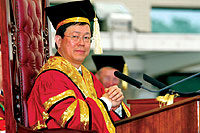 |
"The Institute is conscious that it has
to revisit its role, review its comparable strength, and enhance
the effectiveness of its governance and management." |
It is my great pleasure
to write the second Annual Report Foreword since I assumed office
as the Chairman of the Council of the Institute in April 2003.
The academic year 2003-04 represented an important milestone in
the development of the Institute since its establishment in 1994.
The phenomenal growth and achievements of the Institute over one
decade culminated in the granting of self-accrediting status by
the Hong Kong Special Administrative Region Government with effect
from 1 May 2004. I would like to register formally my acknowledgement
and deep gratitude to Professor Paul Morris who has worked on this
mission and led the staff and students throughout the upgrading
process. The achievement was evidenced by the encouraging remarks
made by the University Grants Committee (UGC) in its Report submitted
to the Government, which stated that "the Institute is strongly
led in respect of quality" and it has "reached the level of
maturity, sophistication and effectiveness at which it was appropriate
to transfer accreditation from external agencies to the Institute
itself."
With the fast changing landscape of Hong Kong's higher education,
the Institute is conscious that it has to revisit its role, review
its comparable strength, and enhance the effectiveness of its governance
and management in order to respond to community needs and to achieve
its objectives. By moving ahead with the establishment of a Task
Force and three Focus Groups, as well as through in-depth discussions
in two Council retreats, we were better able to map out coordinated
strategies for the long term development of the Institute.
While very clear about the well-defined role of the Institute among
Hong Kong's higher education institutions in focusing on teacher
education, the Council has been exploring and examining appropriate
actions in relation to the feasibility, desirability and form of
deep collaboration with other local tertiary institutions.
Internally, the governance structure of the Council has been streamlined
by dissolving some committees and subsuming a few sub-committees
under other committees. With the new Council structure, policy deliberation
and decision making have been made more focused and efficient.
At the Institute level, the management has successfully introduced
and implemented the Voluntary Departure Scheme for non-academic
staff, which resulted in savings of some 20 percent in non-academic
staffing expenditure and allowed the Institute to focus resources
on its core activities.
With the successful execution of out-tasking for security, cleaning,
landscaping and other non-academic services in the previous academic
year, the Institute took a further step by outsourcing its internal
audit service in 2003-04. By permitting operations to be scrutinised
by an independent and professional third party, it will ensure we
achieve greater transparency as a publicly-funded organisation.
The local higher education sector faced unprecedented challenges
in the academic year 2003-04. Steered by the UGC through the introduction
of a Matching Grant Scheme in 2003, the Institute, like other universities,
endeavoured to foster a culture of philanthropy and altruism among
its alumni and members of the community. Raising funds and donations
is admittedly a daunting task for any tertiary institution, especially
one which focuses on teacher education. The Institute has nonetheless
made significant headway in soliciting donations within the year.
I am indeed very proud of the spirit and effort Institute staff
have demonstrated in meeting these challenges.
In the foreseeable future, the macro perspective of a keenly competitive
higher education sector, the decline in resources, the rigorous
pace of local education reforms and a rapidly declining school age
student population are key factors we have to contend with. Notwithstanding
these, we are determined to focus our best efforts in surmounting
the challenges.
This Foreword will not be complete without expressing my most sincere
appreciation for the contributions made by retiring Council Members,
Mr Alfred Chan Wing-kin, Mrs Angela Cheung Wong Wan-yiu, JP, Mr
Ho Tin-yau, Mr Lin Man-sheung, Sir William Taylor, CBE, Professor
Amy Tsui Bik-may and Dr Jan Westrick.
Last but not least, I would also like to welcome six new Council
Members, namely Mr Chan Wing-kwong, MH, Dr Cheung Kwok-wah, Mrs
Sylvia Cheung Tsoi Wing-tin, Mr Ma Siu-leung, Mr Tai Hay-lap, BBS,
JP and Professor Bernard Luk Hung-kay who joined the Institute in
September 2003 as Vice President (Academic). With the wealth of
knowledge, experience and commitment both of our ongoing and our
new Members, and the support of the Government and the Hong Kong
community, I am confident that the Council and the management will
continue to work as a cohesive team for the positive development
of the Institute as well as for the betterment of teacher education
and the school community in Hong Kong.

Thomas K Leung, BBS, JP
Chairman of the Council
|


